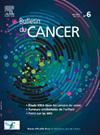Les anticorps–drogues conjugués dans le cancer du sein : mécanismes de résistance et perspectives
IF 0.8
4区 医学
Q4 ONCOLOGY
引用次数: 0
Abstract
Les anticorps–drogues conjugués révolutionnent la prise en charge du cancer du sein grâce à leur ciblage spécifique et leur efficacité cytotoxique. Malgré des avancées significatives avec des agents tels que le trastuzumab emtansine, le sacituzumab govitecan et le trastuzumab deruxtecan, des mécanismes de résistance limitent leur efficacité. Ces résistances incluent une expression réduite ou hétérogène de la cible antigénique à la surface des cellules tumorales (HER2, TROP2), des mutations dans les gènes codant pour les cibles des agents cytotoxiques, un efflux accru de ces agents en dehors de la cellule, ainsi que des altérations du trafic intracellulaire. Ces résistances sont associées à une diminution de l’efficacité des anticorps–drogues conjugués et soulignent la nécessité de développer de nouvelles stratégies, telles que le développement d’anticorps–drogues conjugués de nouvelle génération en optimisant les systèmes de conjugaison par exemple. Les perspectives thérapeutiques intègrent également le développement d’anticorps bispécifiques, le ciblage de nouvelles protéines comme HER3, ainsi que l’association des anticorps–drogues conjugués avec d’autres traitements, notamment les inhibiteurs de points de contrôle immunitaire ou d’autres anticorps–drogues conjugués. Malgré ces avancées, des défis subsistent, notamment dans l’identification des biomarqueurs de réponse et la définition de la séquence thérapeutique optimale afin d’éviter la résistance croisée. La recherche en cours vise à affiner l’utilisation des anticorps–drogues conjugués pour maximiser leur efficacité et prolonger la survie des patientes atteintes de cancer du sein.
Antibodies–drugs conjugate (ADC) are revolutionizing breast cancer treatment thanks to their specific targeting and cytotoxic efficacy. Despite significant advances with agents such as trastuzumab emtansine, sacituzumab govitecan and trastuzumab deruxtecan, resistance mechanisms limit their efficacy. These include reduced or heterogeneous expression of the antigenic target on the surface of tumour cells (HER2, TROP2), mutations in genes encoding the targets of cytotoxic agents, increased efflux of these agents out of the cell, and alterations in intracellular trafficking. These resistances are associated with reduced efficacy of ADCs, underlining the need for new strategies, such as the development of next-generation ADCs by optimizing conjugation systems, for example. Therapeutic prospects also include the development of bispecific antibodies, the targeting of new proteins such as HER3, and the combination of ADCs with other treatments, notably immune checkpoint inhibitors or other ADCs. Despite these advances, challenges remain, notably in identifying biomarkers of response and defining the optimal therapeutic sequence to avoid cross-resistance. Ongoing research is aimed at refining the use of ADCs to maximize their efficacy and prolong the survival of breast cancer patients.
[乳腺癌中的抗体-药物结合物:耐药机制和前景]。
抗体-药物偶联物(ADC)由于其特异性靶向和细胞毒性作用,正在彻底改变乳腺癌的治疗。尽管曲妥珠单抗emtansine、sacituzumab govitecan和曲妥珠单抗deruxtecan等药物取得了重大进展,但耐药机制限制了它们的疗效。这些包括肿瘤细胞表面抗原靶点(HER2、TROP2)的表达减少或异质表达,编码细胞毒性药物靶点的基因突变,这些药物流出细胞的增加,以及细胞内运输的改变。这些耐药性与adc的有效性降低有关,强调了对新策略的需求,例如通过优化偶联系统开发下一代adc。治疗前景还包括双特异性抗体的开发,HER3等新蛋白的靶向,以及adc与其他治疗方法的结合,特别是免疫检查点抑制剂或其他adc。尽管取得了这些进展,但挑战依然存在,特别是在识别反应的生物标志物和确定最佳治疗顺序以避免交叉耐药方面。正在进行的研究旨在改进adc的使用,以最大限度地提高其疗效并延长乳腺癌患者的生存期。
本文章由计算机程序翻译,如有差异,请以英文原文为准。
求助全文
约1分钟内获得全文
求助全文
来源期刊

Bulletin Du Cancer
医学-肿瘤学
CiteScore
1.90
自引率
16.70%
发文量
224
审稿时长
37 days
期刊介绍:
Without doubt, the ''Bulletin du Cancer'' is the French language publication of reference in the field of cancerology. Official organ of the French Society of Cancer, this journal covers all the information available, whether in the form of original articles or review articles, but also clinical cases and letters to the editor, including various disciplines as onco-hematology, solids tumors, medical oncology, pharmacology, epidemiology, biology as well as fundamental research in cancerology. The journal proposes a clinical and therapeutic approach of high scientific standard and regular updates in knowledge are thus made possible. Articles can be submitted in French or English.
 求助内容:
求助内容: 应助结果提醒方式:
应助结果提醒方式:


